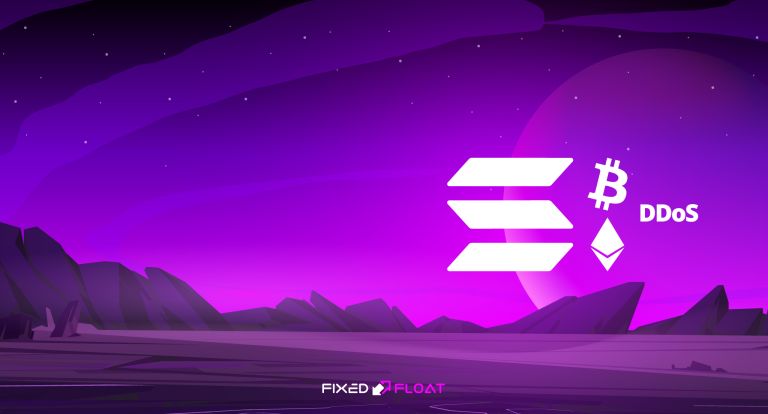Market correction
We've seen some interesting fluctuations in the cryptocurrency market this week. Bitcoin tested its strength again, rising to local highs around $38,000, and then immediately descending to the lower boundary of the resistance line. This phenomenon highlights the volatility of this asset. Bitcoin's fluctuations have had negative consequences for other cryptocurrencies as well. Ethereum lost 4% of its value in one day. Solana (SOL) and Chainlink (LINK) also felt the pressure, losing 12.6% and 7.4% respectively.
In the context of the general market decline, the Avalanche (AVAX) blockchain token has surprised with its resilience. During Bitcoin's decline, AVAX moved in the opposite direction, increasing its value by 5.3%.
The cost of gas in the Polygon network increased by 1000%
On November 16th, there was a sudden increase in the price of gas in the Polygon ecosystem, when it almost increased 10 times, reaching the threshold of 5000 Gwei (~$0.1). During this period, the Polygon blockchain also experienced a boom in activity, with the total number of transactions increasing from 2.89 million to an all-time high of 16.5 million. For those interested, it is worth noting that despite this surge in activity, fees on the Polygon network, even during peak periods, remained lower than on Ethereum, where transfer costs reached $30.
Since this article was written, gas prices on the Polygon network have settled at the more standard 1000 Gwei. This surge in activity and gas prices has been fueled by the rise in popularity of the recently launched PRC-20 standard, which allows for the creation of unique tokens similar to Ordinals on the Bitcoin network.
ETF hype continues to drive up Bitcoin network fees
The likely approval of a spot Bitcoin exchange-traded fund (ETF) in the US has sparked demand for the leading cryptocurrency, which in turn has led to a significant increase in transaction fees. On November 16, the Bitcoin network earned a record $11.6 million in commissions. Average transaction fees rose to $18.69, up 113% from the previous day and a whopping 746% higher than a year ago.
Paxos will launch a new stablecoin
Innovative blockchain company Paxos announces it has received approval from the Monetary Authority of Singapore (MAS) to issue its new “stable coin” pegged to the US dollar. According to the statement, this asset is fully backed by US currency and related cash equivalents. Paxos has committed to subject its reserves to monthly audits and to provide regular reports on the status of its reserves.
MAS has assessed the stablecoin as compliant with the norms and requirements proposed by the regulator, even before their full entry into force, as announced in the official press release. Paxos also actively supports and complies with the strict anti-money laundering (AML) and customer verification (KYC) standards set by the Singapore authorities.
In 2022, Paxos became the first US blockchain platform to be licensed by MAS to provide digital payment token services. However, on February 10, 2023, the New York State Department of Financial Services began an investigation into Paxos. Subsequently, the regulator issued an order to cease issuing the BUSD token, but this did not affect Paxos’ determination to continue working on the development of its innovative solutions in the blockchain field.
Tether plans to develop the mining industry
Tether is preparing to invest $500 million in the mining space, planning to revolutionize the industry. The company plans to use funds to build new mining farms and support miners. Mining farms will be built in countries such as Uruguay, Paraguay and El Salvador, with the goal of achieving an impressive amount of computing power and establishing their share of 1% of the entire Bitcoin network.
This ambitious move demonstrates the strategic vision of Tether, which Paolo Ardoino previously spoke about. In 2024, Tether plans to release five revolutionary projects that promise to change the world of cryptocurrencies and perhaps change the world of Web2 services forever.
CertiK analysts discovered a critical vulnerability in a smartphone from Solana
Experts from CertiK announced a vulnerability in the Saga smartphone from Solana, which could pose a threat to the security of users’ cryptocurrency assets. During an emergency analysis, they were able to insert a backdoor into the device and successfully unlock access to the operating system bootloader.
The Saga smartphone warned about changes to the software structure with a message that "the integrity of the program cannot be guaranteed." The next step, the researchers connected the smartphone to the Wi-Fi network, establishing a connection with the command and control server on the laptop. By using root rights on the vulnerable device and activating bash scripts, they were able to extract all the Bitcoin from the built-in wallet.
Despite these results, Solana denies the presence of vulnerabilities in its Saga smartphones and points to the absence of specific vulnerabilities in the provided video footage from CertiK. One of Solana Labs' engineers, Steven Laver, announced that the video demonstrates the bootloader unlocking procedure, which he believes can be performed on most Android devices.
Dogecoin wallet will be sent to the Moon
The Dogecoin community has announced its unique plan to send a DOGE wallet on a journey to the moon. This exciting initiative will be implemented as part of the Peregrine Mission One mission, which is implemented by the space company Astrobotic.
The physical DOGE wallet will be placed in a special “Moon Capsule” along with other valuable souvenirs brought from all over the world. These souvenirs will include photographs, literary works, and even a piece of stone mined from the top of Mount Everest. In addition to this amazing initiative, Astrobotic has already carried a 1 BTC wallet on board ULA's Vulcan Centaur rocket, courtesy of BitMEX, and even a plaque with a copy of the Bitcoin genesis block, courtesy of Bitcoin Magazine.
All these valuables will go on an amazing journey to the Moon on December 23, 2023, starting from Cosmodrome 41 at Cape Canaveral in Florida. This event promises to be a historic step in the world of cryptocurrencies and space exploration.










